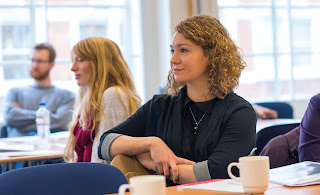Whether you work in a cubicle or from your
living room, there are things you can do to make getting through the working
day a bit easier.
Today, we’re going to give you some of our top
tips, tried and tested by us, for making time spent at your desk less tortuous!
- Light!
Wherever your work area
is situated, try to make sure there’s adequate lighting, particularly if you
work at a computer. Fluorescent lighting can cause headaches and fatigue, so
bring in a desk lamp if the lighting available isn’t good enough. Where
possible, make the most of natural sunlight. Whilst this isn’t always easy with
British weather, natural light can make use feel more energised, more motivated
and aids concentration.
2. Air!
Think back to your
school days when teachers insisted on having windows wide open regardless of
the season in the name of ‘good ventilation’. As it happens, they were on to
something! The circulation of fresh air also contributes to better
concentration levels, and can also help to stop us feeling drowsy.
3. Plants!
Bring some plants into
your workspace. Not only do they create a more stimulating work environment
because of the variety of colour, but they also produce Oxygen – increase
Oxygen levels and you increase concentration and the ability to deal with
difficult and complex tasks.
4. Lunch!
Make time to eat. By eating
at regular times, and choosing sensible foods you can better control your
blood-sugar level. For instance, when your blood-sugar level rises after eating
lunch, it should also up your ability to concentrate. Try to spend your lunch
break away from your desk – walk to the cafeteria, go and sit with a colleague,
if it’s nice weather eat outside. Creating a psychological break can work
wonders for your motivation when you get back.
5. People!
Talk to the people
around you! Not only can this help in a practical sense, in terms of sharing
ideas and help with specific projects, but also in preventing feelings of
isolation and creating energy. Even if
you work from home, try to get in contact with others throughout the day,
either through meetings, phone calls or Skype.
6. Exercise!
Researchers at the
University of Bristol found that workers who exercised before work or during
their lunch break were more able to cope with whatever the working day had in
store for them. Improvements were noted in time management, workload
management, stress reduction, mood, motivation, concentration, productivity and
performance! If that’s not enough reason to dig out your trainers I don’t know
what is!
If, like me, you find the thought of
sacrificing your precious lunch break to put yourself through hell on the
treadmill, fear not! There are alternatives…
Insight have been based in a range of places
over the years, and we’ve been lucky enough to have some fantastically situated
offices. Several years ago, we used to work here:
One of our Directors used to routinely go out
for walks, sometimes taking a Dictaphone to work on documents (Remember
those??!). Half an hour spent walking still has a significant benefit. If
you’re not lucky enough to be surrounded by scenery, walk to a local café for
lunch, or take a longer route into work.
7. Pets!

Not every work environment would be too pleased
with you bringing your Great Dane to work, but if you are able to work in proximity
to animals, do! A key member of the
Insight team for a number of years was ‘Smudge’. Smudge would spend most of the
working week in the office with her owner but had her own roles and
responsibilities: promoting exercise (as we’ve already discussed) by coercing
employees to take her out for a walk, and providing stress relief by offering to
be petted. Her presence acted as a calming influence on the work environment,
which was noticeably different when she wasn’t there. This may be a particular benefit if you work
from home – make the most of your pet during work hours, as it will make a
notable difference to your work!
Lastly, a few words on working from home - as
Insight no longer uses an office base, our team are very aware of the pros and
cons of working from home. It can be challenging to maintain motivation and
concentration if you work alone in your home environment, but there are a few
things you can do to make it easier:
- Make your workspace separate – set up a desk
and create an area which is solely for working. This creates a psychological
pattern of ‘when I’m here, I work’, rather than being distracted by the way you
use your house outside of work hours.
- Set yourself clear working hours, with clear
breaks, so that you don’t feel guilty for taking time out and so that you can
‘switch off’ from work at the end of the day.
- Dress for work! This doesn’t mean to need to be
cracking out the tie and cufflinks on a daily basis, but working in your
pyjamas has an effect on your productivity!
These are our top tips – what else have you
found that works for you?
~ Laura

.jpg)













.jpg)
.jpg)